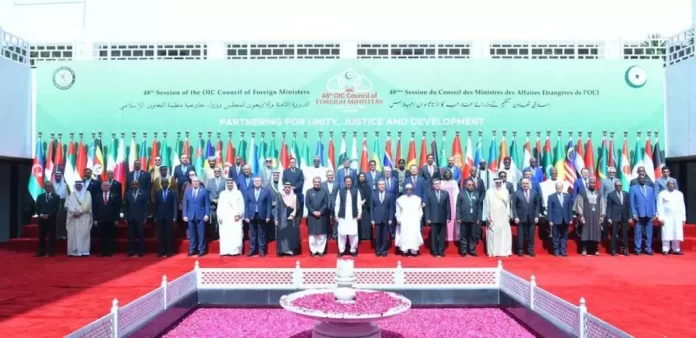The 48th OIC (Organization of Islamic Cooperation) was hosted by Pakistan this Year. Taking place in Islamabad between 22nd and 23rd of March, the theme for this year’s conference was ‘building partnership for unity, justice and development.’
Foreign Minister Shah Mahmood Qureshi chaired the Council of Foreign Ministers, and foreign dignitaries were guests of honour for the annual military parade. But the most noteworthy part of this year’s conference was Prime Minister Imran Khan’s speech, in particular his comments on Kashmir and Palestine.
While addressing foreign dignitaries, the Prime Minister said, “we have failed both the Palestinians and the people of Kashmir.” His admission, although a deeply disappointing reality, was refreshingly honest.
Prime Minister Khan told OIC members that they were “a divided house,” and made “no impact at all,” over Kashmir and Palestine.
“We are 1.5 billion people, and yet our voice to stop this blatant injustice is insignificant. We are not talking about conquering some country. We are simply talking about the human rights of the people of Kashmir and Palestine.”
The OIC’s lacklustre approach has been a huge part of the problem, failing to push forward the case for the people of Kashmir and Palestine. It is outrageous that despite Kashmir’s legitimate right to self-determination, the hopes of the people of Kashmir have been dashed.
This was acknowledged by Imran Khan, who said, “the international law, which is on their side, United Nations security council resolutions that backed their right in Kashmir, the international community that promised them the right to decide their own destiny through a plebiscite, that right was never given to them.” He also referred to the situation in Palestine as a “daylight robbery.”
For Kashmir and Palestine to remain unresolved and ignored by the rest of the world, is a real tragedy. And when we compare it against the international outrage over the Russia – Ukraine crisis as well as the overwhelming support for Ukrainians, the double standards of the international community become glaringly obvious. All we need to do is take a look at how the world has immersed itself into the Ukraine crisis, while conveniently looking the other way when it comes to occupation elsewhere.
A conflict anywhere in the world is distressing to witness. Accounts coming out of Ukraine of families being separated and people having to flee their homes is difficult to digest. However, one cannot help but feel frustrated by the international community’s selective outrage. We have to call out world leaders that are vocal over Ukraine but remain silent and unmoved by other injustices happening.
Anyone highlighting the double standards is accused of whataboutism and pushed back with a strange logic of this not being the right time to bring up other conflicts. But when is it ever the right time? And why can we not do both? Whether it is Kashmir, Palestine, Yemen, Syria or anywhere else in the world, innocent people are suffering, and their pain should not have to be placed on hold.
It is also funny how the international community sits up and starts taking violations of international law seriously where and when it suits them. But when Indian occupied Kashmir is kept under constant curfew and people are forced out of their homes in Israel, human rights violations and international law all of a sudden become alien, and the aggressors receive a free pass.
The world has to stop defining occupation based on personal equations. No one can rally behind Ukraine while telling others that they cannot stand up to occupation in their own back yard. This pick and choose mind set of who to support and who to snub is totally unacceptable.
Also, when we look at the media coverage of Ukraine and the refugee crisis in particular and compare it with how the media covers other issues, there is a blatant double standard in their reporting. International reporters speaking of how they can relate to these refugees who “look like us,” reeks of racism.
So, it should come as no real surprise that a CBS news correspondent had to apologise for saying that Ukraine is more “civilised” than Iraq and Afghanistan. In his apology, Charlie D’Agata, a senior foreign correspondent, apologised for his “poor choice of words.” A clip which contained Charlie D’Agata’s comments was circulated on social media and drew heavy criticism.
But D’Agata is not the only one. Similar comments have been made; the only difference is that apologies were not issued. It is astonishing how sympathy is felt for “blue eyed blonde haired” people of the “civilised” world. But refugees fleeing bloodshed and occupation from black and brown countries do not receive the same amount of compassion simply because they look different.
Ukraine deserves attention from the rest of the world. Ukraine receiving support during these difficult times is not the problem. The problem arises when other people are not given the same importance and their struggles undermined.
This is where unity among OIC members could have played a significant role towards resolving longstanding conflicts. But at the end of the day, there is no unity. Although Imran Khan did mention that no country needed to “alter” its foreign policies, fact of the matter is that trade is a massive reason why the OIC remains a toothless body.
If OIC members cannot get their act together, looking towards the rest of the world and expecting western countries to step up instead is a big ask. Imran Khan was right to pinpoint where mistakes have been made. But whether this will help them find their moral compass, seems highly unlikely. Until words are converted into action, the OIC shall remain without purpose.




